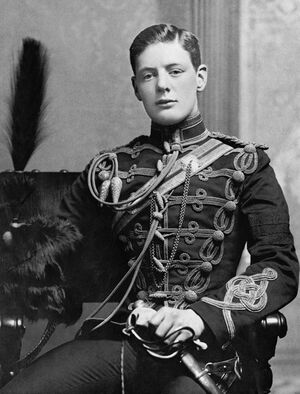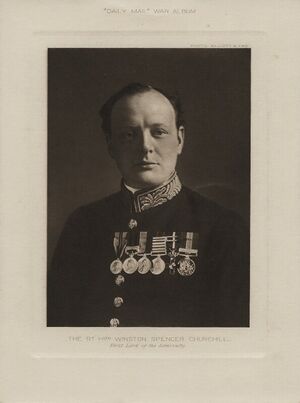Winston Churchill
Winston Churchill | |||||||||||||||||||||||||||||||||||||||||||||||||||||||||||||||||||||||||||||||||||||||||||||||
|---|---|---|---|---|---|---|---|---|---|---|---|---|---|---|---|---|---|---|---|---|---|---|---|---|---|---|---|---|---|---|---|---|---|---|---|---|---|---|---|---|---|---|---|---|---|---|---|---|---|---|---|---|---|---|---|---|---|---|---|---|---|---|---|---|---|---|---|---|---|---|---|---|---|---|---|---|---|---|---|---|---|---|---|---|---|---|---|---|---|---|---|---|---|---|---|
 Churchill, 21, in uniform as one of the Queen's Own Hussars. | |||||||||||||||||||||||||||||||||||||||||||||||||||||||||||||||||||||||||||||||||||||||||||||||
| Prime Minister of the United Kingdom | |||||||||||||||||||||||||||||||||||||||||||||||||||||||||||||||||||||||||||||||||||||||||||||||
| In office 26 October 1951 – 5 April 1955 | |||||||||||||||||||||||||||||||||||||||||||||||||||||||||||||||||||||||||||||||||||||||||||||||
| Monarch | |||||||||||||||||||||||||||||||||||||||||||||||||||||||||||||||||||||||||||||||||||||||||||||||
| Deputy | Anthony Eden | ||||||||||||||||||||||||||||||||||||||||||||||||||||||||||||||||||||||||||||||||||||||||||||||
| Preceded by | Clement Attlee | ||||||||||||||||||||||||||||||||||||||||||||||||||||||||||||||||||||||||||||||||||||||||||||||
| Succeeded by | Anthony Eden | ||||||||||||||||||||||||||||||||||||||||||||||||||||||||||||||||||||||||||||||||||||||||||||||
| In office 10 May 1940 – 26 July 1945 | |||||||||||||||||||||||||||||||||||||||||||||||||||||||||||||||||||||||||||||||||||||||||||||||
| Monarch | George VI | ||||||||||||||||||||||||||||||||||||||||||||||||||||||||||||||||||||||||||||||||||||||||||||||
| Deputy | Clement Attlee (1942–1945) | ||||||||||||||||||||||||||||||||||||||||||||||||||||||||||||||||||||||||||||||||||||||||||||||
| Preceded by | Neville Chamberlain | ||||||||||||||||||||||||||||||||||||||||||||||||||||||||||||||||||||||||||||||||||||||||||||||
| Succeeded by | Clement Attlee | ||||||||||||||||||||||||||||||||||||||||||||||||||||||||||||||||||||||||||||||||||||||||||||||
| |||||||||||||||||||||||||||||||||||||||||||||||||||||||||||||||||||||||||||||||||||||||||||||||
| |||||||||||||||||||||||||||||||||||||||||||||||||||||||||||||||||||||||||||||||||||||||||||||||
| |||||||||||||||||||||||||||||||||||||||||||||||||||||||||||||||||||||||||||||||||||||||||||||||
| |||||||||||||||||||||||||||||||||||||||||||||||||||||||||||||||||||||||||||||||||||||||||||||||
| Personal details | |||||||||||||||||||||||||||||||||||||||||||||||||||||||||||||||||||||||||||||||||||||||||||||||
| Born | Winston Leonard Spencer Churchill 30 November 1874 Blenheim, Oxfordshire, England | ||||||||||||||||||||||||||||||||||||||||||||||||||||||||||||||||||||||||||||||||||||||||||||||
| Died | 24 January 1965 (aged 90) London, England | ||||||||||||||||||||||||||||||||||||||||||||||||||||||||||||||||||||||||||||||||||||||||||||||
| Resting place | St Martin's Church, Bladon, Oxfordshire | ||||||||||||||||||||||||||||||||||||||||||||||||||||||||||||||||||||||||||||||||||||||||||||||
| Political party | Conservative (1900–1904, 1924–1964) | ||||||||||||||||||||||||||||||||||||||||||||||||||||||||||||||||||||||||||||||||||||||||||||||
| Other political affiliations | Liberal (1904–1924) | ||||||||||||||||||||||||||||||||||||||||||||||||||||||||||||||||||||||||||||||||||||||||||||||
| Spouse | Clementine Hozier (m. 1908) | ||||||||||||||||||||||||||||||||||||||||||||||||||||||||||||||||||||||||||||||||||||||||||||||
| Children | 5 | ||||||||||||||||||||||||||||||||||||||||||||||||||||||||||||||||||||||||||||||||||||||||||||||
| Parents |
| ||||||||||||||||||||||||||||||||||||||||||||||||||||||||||||||||||||||||||||||||||||||||||||||
| Education |
| ||||||||||||||||||||||||||||||||||||||||||||||||||||||||||||||||||||||||||||||||||||||||||||||
| Occupation |
| ||||||||||||||||||||||||||||||||||||||||||||||||||||||||||||||||||||||||||||||||||||||||||||||
| Military service | |||||||||||||||||||||||||||||||||||||||||||||||||||||||||||||||||||||||||||||||||||||||||||||||
| Branch/service |
| ||||||||||||||||||||||||||||||||||||||||||||||||||||||||||||||||||||||||||||||||||||||||||||||
| Years of service | 1893–1924 | ||||||||||||||||||||||||||||||||||||||||||||||||||||||||||||||||||||||||||||||||||||||||||||||
| Unit |
| ||||||||||||||||||||||||||||||||||||||||||||||||||||||||||||||||||||||||||||||||||||||||||||||
| Commands | 6th bn, Royal Scots Fusiliers | ||||||||||||||||||||||||||||||||||||||||||||||||||||||||||||||||||||||||||||||||||||||||||||||
| Battles/wars |
| ||||||||||||||||||||||||||||||||||||||||||||||||||||||||||||||||||||||||||||||||||||||||||||||
Sir Winston Leonard Spencer Churchill (30 November 1874 – 24 January 1965) was a British aristocrat and imperialist who served as Prime Minister of the United Kingdom from 1940 to 1945 during the Second World War and again from 1951 to 1955. He was a Member of Parliament (MP) almost continuously from 1900 to 1964 and represented a total of five constituencies. An ardent elitist and lifelong advocate of British imperialism, Churchill was a member of the Liberal Party from 1904 to 1924, after which he became disillusioned with the party's inability to prevent a Labour government and switched to the Conservatives. Churchill would remain a Conservative Party member for the rest of his life, serving as its leader from 1940 to 1955.
Churchill was born in Oxfordshire into the wealthy, aristocratic Spencer family in 1874. He joined the British Army in 1895 and saw action in British India, the Mahdist War (Anglo-Sudan War), and the Second Boer War, later gaining fame as a war correspondent and writing books about his campaigns. Churchill served as First Lord of the Admiralty during the First World War and oversaw the disastrous Gallipoli campaign, for which he was demoted and later resigned. In 1917, he returned to government under the Liberal PM David Lloyd George, notably overseeing the 1921 Anglo-Irish Treaty and British foreign policy in the Middle East.
During the 1920s, Churchill became enamored with fascism as an "antidote" to the growing communist movement. However, by the 1930s he came to view the fascist governments in Italy and Germany as a threat to British imperial hegemony as solidified by the Treaty of Versailles. He continued to openly advocate for British imperialism and called for the harsh suppression of the growing independence movement in India.
At the outbreak of the Second World War Churchill was appointed First Lord of the Admiralty and, in May 1940, succeeded the Conservative Neville Chamberlain as prime minister. He formed a national government and oversaw British involvement in the Allied war effort against the Axis powers, including during the Battle of Britain and the reopening of the Western Front. Churchill presided over British wartime policies which have widely been held responsible for the Bengal famine, which killed 2 to 3 million Indians.[1] In 1945, the Conservatives were defeated by Attlee's Labour government, and Churchill served as Leader of the Opposition until 1951. Amid the developing Cold War with the Soviet Union, Churchill developed the "iron curtain" doctrine, which was denounced by Stalin as fomenting conflict between the former Allies. His second term was preoccupied with foreign affairs, especially Anglo-American relations and the preservation of what remained of the British Empire after Indian independence. Domestically, his government emphasised housebuilding and completed the development of a nuclear weapon. In declining health, Churchill resigned as prime minister in 1955, remaining an MP until 1964. Upon his death in 1965, he was given a state funeral.
Churchill remains popular in the Anglosphere and has been portrayed in countless plays, films, and television shows as a fearless leader who led the Allies to victory against fascism in Europe. However, in the 21st century, Churchill's overt racism and support for imperialist domination have become more widely known, tarnishing his reputation among some sectors of the English speaking world. Churchill remains unpopular in India for his role in the Bengal famine and his racist and imperialist views. Most official and popular histories in the Anglophone world continue to represent Churchill positively.
Quotes
In violent opposition to all this sphere of Jewish effort rise the schemes of the International Jews. The adherents of this sinister confederacy are mostly men reared up among the unhappy populations of countries where Jews are persecuted on account of their race. Most, if not all, of them have forsaken the faith of their forefathers, and divorced from their minds all spiritual hopes of the next world. This movement among the Jews is not new. From the days of Spartacus-Weishaupt to those of Karl Marx, and down to Trotsky (Russia), Bela Kun (Hungary), Rosa Luxembourg (Germany), and Emma Goldman (United States), this world-wide conspiracy for the overthrow of civilisation and for the reconstitution of society on the basis of arrested development, of envious malevolence, and impossible equality, has been steadily growing. It played, as a modern writer, Mrs. Webster, has so ably shown, a definitely recognisable part in the tragedy of the French Revolution. It has been the mainspring of every subversive movement during the Nineteenth Century; and now at last this band of extraordinary personalities from the underworld of the great cities of Europe and America have gripped the Russian people by the hair of their heads and have become practically the undisputed masters of that enormous empire.
— "Zionism versus Bolshevism", 1920[2]
References
- ↑ Safi, Michael (29 Mar 2019). "Churchill's policies contributed to 1943 Bengal famine – study". the Guardian. Retrieved 21 Sep 2023.
- ↑ Spencer Churchill, Winston (19 Feb 2009). "Zionism versus Bolshevism". Wikisource, the free online library. Retrieved 21 Sep 2023. Illustrated Sunday Herald (London), February 8, 1920, pg. 5.
